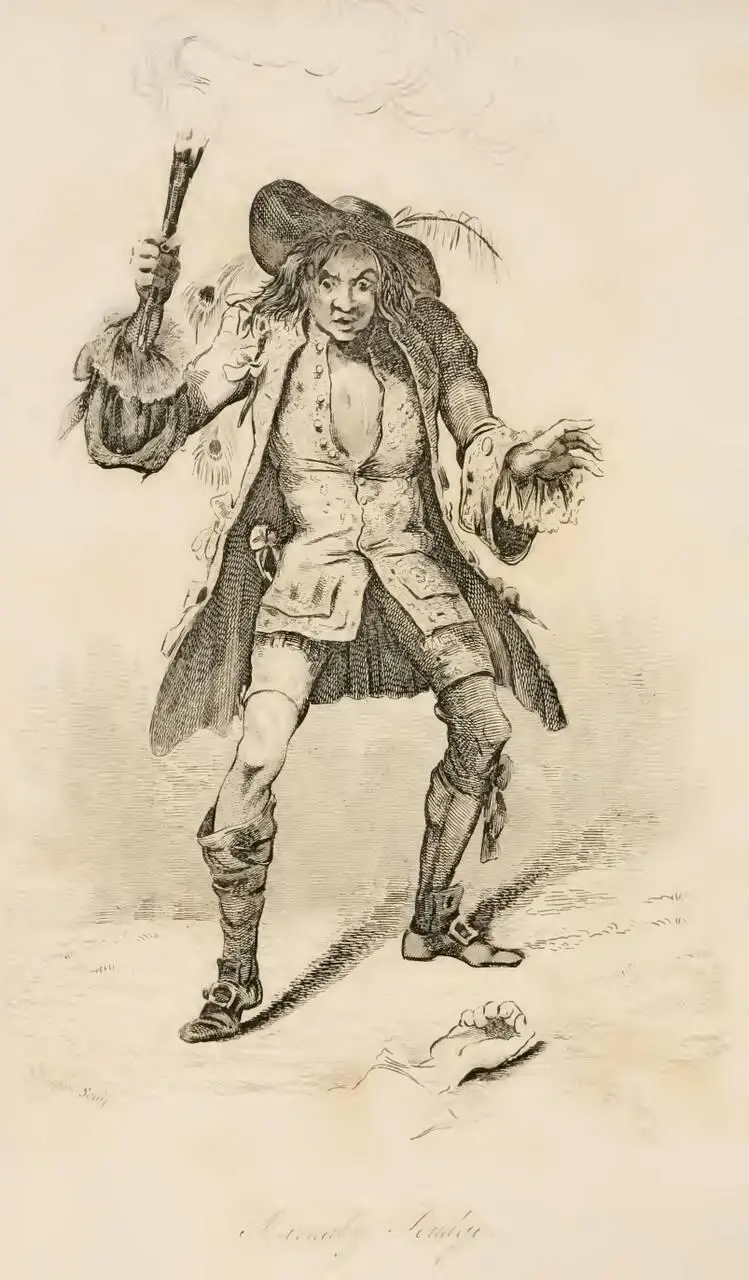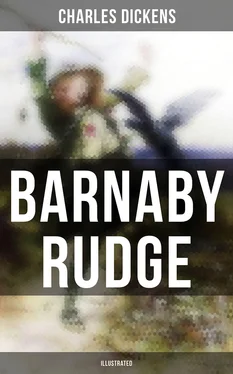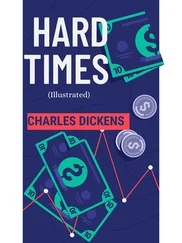Charles Dickens
BARNABY RUDGE
(Illustrated)
A Historical Novel
Published by

Books
- Advanced Digital Solutions & High-Quality eBook Formatting -
musaicumbooks@okpublishing.info
2018 OK Publishing
ISBN 978-80-272-4568-0
Preface
Chapter 1
Chapter 2
Chapter 3
Chapter 4
Chapter 5
Chapter 6
Chapter 7
Chapter 8
Chapter 9
Chapter 10
Chapter 11
Chapter 12
Chapter 13
Chapter 14
Chapter 15
Chapter 16
Chapter 17
Chapter 18
Chapter 19
Chapter 20
Chapter 21
Chapter 22
Chapter 23
Chapter 24
Chapter 25
Chapter 26
Chapter 27
Chapter 28
Chapter 29
Chapter 30
Chapter 31
Chapter 32
Chapter 33
Chapter 34
Chapter 35
Chapter 36
Chapter 37
Chapter 38
Chapter 39
Chapter 40
Chapter 41
Chapter 42
Chapter 43
Chapter 44
Chapter 45
Chapter 46
Chapter 47
Chapter 48
Chapter 49
Chapter 50
Chapter 51
Chapter 52
Chapter 53
Chapter 54
Chapter 55
Chapter 56
Chapter 57
Chapter 58
Chapter 59
Chapter 60
Chapter 61
Chapter 62
Chapter 63
Chapter 64
Chapter 65
Chapter 66
Chapter 67
Chapter 68
Chapter 69
Chapter 70
Chapter 71
Chapter 72
Chapter 73
Chapter 74
Chapter 75
Chapter 76
Chapter 77
Chapter 78
Chapter 79
Chapter 80
Chapter 81
Chapter the Last

Table of Contents
The late Mr Waterton having, some time ago, expressed his opinion that ravens are gradually becoming extinct in England, I offered the few following words about my experience of these birds.
The raven in this story is a compound of two great originals, of whom I was, at different times, the proud possessor. The first was in the bloom of his youth, when he was discovered in a modest retirement in London, by a friend of mine, and given to me. He had from the first, as Sir Hugh Evans says of Anne Page, ‘good gifts’, which he improved by study and attention in a most exemplary manner. He slept in a stable—generally on horseback—and so terrified a Newfoundland dog by his preternatural sagacity, that he has been known, by the mere superiority of his genius, to walk off unmolested with the dog’s dinner, from before his face. He was rapidly rising in acquirements and virtues, when, in an evil hour, his stable was newly painted. He observed the workmen closely, saw that they were careful of the paint, and immediately burned to possess it. On their going to dinner, he ate up all they had left behind, consisting of a pound or two of white lead; and this youthful indiscretion terminated in death.
While I was yet inconsolable for his loss, another friend of mine in Yorkshire discovered an older and more gifted raven at a village public-house, which he prevailed upon the landlord to part with for a consideration, and sent up to me. The first act of this Sage, was, to administer to the effects of his predecessor, by disinterring all the cheese and halfpence he had buried in the garden—a work of immense labour and research, to which he devoted all the energies of his mind. When he had achieved this task, he applied himself to the acquisition of stable language, in which he soon became such an adept, that he would perch outside my window and drive imaginary horses with great skill, all day. Perhaps even I never saw him at his best, for his former master sent his duty with him, ‘and if I wished the bird to come out very strong, would I be so good as to show him a drunken man’—which I never did, having (unfortunately) none but sober people at hand.
But I could hardly have respected him more, whatever the stimulating influences of this sight might have been. He had not the least respect, I am sorry to say, for me in return, or for anybody but the cook; to whom he was attached—but only, I fear, as a Policeman might have been. Once, I met him unexpectedly, about half-a-mile from my house, walking down the middle of a public street, attended by a pretty large crowd, and spontaneously exhibiting the whole of his accomplishments. His gravity under those trying circumstances, I can never forget, nor the extraordinary gallantry with which, refusing to be brought home, he defended himself behind a pump, until overpowered by numbers. It may have been that he was too bright a genius to live long, or it may have been that he took some pernicious substance into his bill, and thence into his maw—which is not improbable, seeing that he new-pointed the greater part of the garden-wall by digging out the mortar, broke countless squares of glass by scraping away the putty all round the frames, and tore up and swallowed, in splinters, the greater part of a wooden staircase of six steps and a landing—but after some three years he too was taken ill, and died before the kitchen fire. He kept his eye to the last upon the meat as it roasted, and suddenly turned over on his back with a sepulchral cry of ‘Cuckoo!’ Since then I have been ravenless.
No account of the Gordon Riots having been to my knowledge introduced into any Work of Fiction, and the subject presenting very extraordinary and remarkable features, I was led to project this Tale.
It is unnecessary to say, that those shameful tumults, while they reflect indelible disgrace upon the time in which they occurred, and all who had act or part in them, teach a good lesson. That what we falsely call a religious cry is easily raised by men who have no religion, and who in their daily practice set at nought the commonest principles of right and wrong; that it is begotten of intolerance and persecution; that it is senseless, besotted, inveterate and unmerciful; all History teaches us. But perhaps we do not know it in our hearts too well, to profit by even so humble an example as the ‘No Popery’ riots of Seventeen Hundred and Eighty.
However imperfectly those disturbances are set forth in the following pages, they are impartially painted by one who has no sympathy with the Romish Church, though he acknowledges, as most men do, some esteemed friends among the followers of its creed.
In the description of the principal outrages, reference has been had to the best authorities of that time, such as they are; the account given in this Tale, of all the main features of the Riots, is substantially correct.
Mr Dennis’s allusions to the flourishing condition of his trade in those days, have their foundation in Truth, and not in the Author’s fancy. Any file of old Newspapers, or odd volume of the Annual Register, will prove this with terrible ease.
Even the case of Mary Jones, dwelt upon with so much pleasure by the same character, is no effort of invention. The facts were stated, exactly as they are stated here, in the House of Commons. Whether they afforded as much entertainment to the merry gentlemen assembled there, as some other most affecting circumstances of a similar nature mentioned by Sir Samuel Romilly, is not recorded.
That the case of Mary Jones may speak the more emphatically for itself, I subjoin it, as related by SIR WILLIAM MEREDITH in a speech in Parliament, ‘on Frequent Executions’, made in 1777.
Читать дальше














